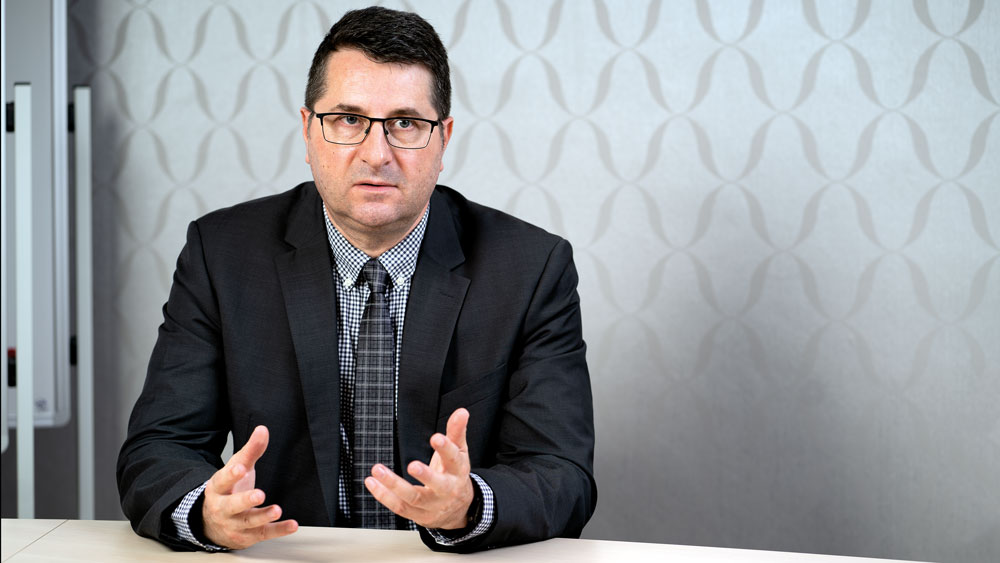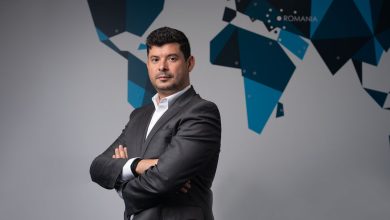Radu Dudau Talks about Romanian Energy Sector Priorities
Massive investment of capital and know how
The Energy Policy Group (EPG) is a Bucharest-based non-profit, independent think-tank on energy policy, market analytics and energy strategy, established in February 2014. EPG’s regional focus is Southeast Europe and the Black Sea Basin, yet it covers the trends and processes at the EU and global levels. EPG promotes a technologically advanced, environmentally friendly and socially acceptable energy system. Its views are self-standing and science-based. EPG’s publications are freely available at www.enpg.ro.
In this interview Radu Dudau – EPG’s Director, reveals EPG’s role in creating a better understanding of policies and processes in the energy sector and proper solutions for the Romanian energy industry and market to function.
The beginnings…
Dear Mr. Dudau, your academic career, focused on teaching and research, is grounded in an interest in international relations, foreign policy, and international energy policy. You have been personal adviser to the Energy Minister, in charge with developing a new National Energy Strategy. How did the idea of establishing the Energy Policy Group emerge?
Radu Dudau: Well, I co-founded EPG quite a few years before I became adviser to the Energy Minister. It was back in 2013, when the public uproar over the shale gas issue was still ongoing in Romania, that I felt the need to start a independent think-tank able to provide the public with quality information, based on evidence and validated science, on energy and environment issues. It was obvious that the Romanian citizens were, from then on, going to have their say in a domain that, in our country, had been traditionally kept outside the purview of public consultation.
At the same time though, a certain deficit of confidence in the official sources of information was palpable. Against a backdrop of anxiety and fear about the supposed consequences of shale gas operations, and suspicious of the intentions of their own government, many Romanians did turn, back then, to various other channels of information, many of which were unchecked, distorted or even manipulative. The press itself seemed to be ineffective in conveying lucidity and reasonableness – that is, when it did not itself fan the flames of hostility and suspicion – while the institutions of higher education, inasmuch as they got involved at all in the debate, were only limitedly able to make themselves heard and respected.
Along with my friend Laurentiu Pachiu, we felt the need to create a new, independent and credible voice that would try to elevate the level of public debate on such issues. This is how we started EPG in February 2014, as a non-governmental organization. Other issues have soon followed in the public discourse: The Black Sea gas finds and their development; the oil and gas fiscal framework in Romania; the Nabucco pipeline – and its demise; the optimal energy mix and the energy strategy itself, etc. In all of these, EPG has been a steady source of information, analysis, and policy recommendations.
What are the goals of the EPG platform?
Radu Dudau: Our goals have been largely delineated above: put succinctly, quality public information on all critical issues in the energy sector. At the same time, EPG purports to serve as trusted interface between the government, the business environment and the broader public. Indeed, in this latter respect, we have earned a good reputation for our specialized, solution-oriented events, in which we bring together the authorities and the relevant stakeholders.
What is EPG’s role in creating a better understanding of policies and processes in the energy sector?
Radu Dudau: By always trying to produce objective, well-reasoned and solidly documented analyses, EPG purports to provide the public with relevant information on relevant topics. We have come to produce substantive papers and reports in virtually all segments of the energy sector. Then, there are our public events (conferences, workshops and roundtables) and educational programs (courses, seminars, and summer schools). We are always learning and enhancing our analytic skills and understanding, while trying to impart that knowledge with others.
What are the main areas on which the EPG is focused? How about the most important research programs carried out by EPG?
Radu Dudau: We started with the O&G sector, but have since diversified to electricity, energy markets, energy efficiency, EU energy and climate policy, renewables, etc. Apart from this sectoral take, we have strong abilities to do strategic energy planning, thanks to our extensive understanding of the Romanian energy system and our quantitative analysis skills.
We have been for the past few years in several international grants focusing on the energy systems of South-eastern Europe, typically involving modelling and quantitative analysis. An overarching concern is to match EU’s ambitious energy and climate goals for the next decades with optimized energy mixes of the region’s countries, and to emphasizes the changes that are needed in support of clean, reliable and affordable energy.
Overview
As analyst specializing in energy, how do you estimate the energy market and the business environment in Romania compared to the interest area covered by EPG – Southeast Europe and the Black Sea Basin?
Radu Dudau: The Romanian energy sector has come a long way since 1989 in terms of its restructuring, modernisation and competitiveness. However, especially over the past few years, significant investments in the sector have been a rarity. This has mainly to do with a regulatory instability that seems to have been running amok. There is barely any segment or sector in which investors would not feel disincentivised by erratic pieces of legislation – including government ordinances – not to mention their often-dubious quality. To a certain extent, this is understandable, given the major policy challenges ahead (such as the corpus of EU climate legislation). Nonetheless, the institutional capacity of the Romanian state in the energy sector seems to exceeded by the tasks ahead of it, and is barely able to keep up with a vibrant private sector.
More generally, there are two underlying traits consistently displayed in public rhetoric at all levels: a mistrust in the workings of the competitive energy markets (although, in theory, as an EU member state, Romania is committed to building and sustaining them, along with the needed checks) and a deeply entrenched inclination towards self-isolation and autarchy, in a syndrome of fortress besieged, in which the ‘goods’ are to be zealously guarded from greedy plunderers.
Leaving aside the figurative language, I am not for a moment suggesting that the state should not vigorously guard its interests. My point is that, after three decades of rediscovered market economy and 12 years of EU membership, it is time for the state to really build capacity, bring forward professionals and draw on genuine know-how. I realize this is easier said than done, but there is no other way to really take advantage of our own potential and what the EU has to offer.
You have recently stated that the gas sector was dysfunctional. Please explain extensively what you refer to and what recovery solutions you envisage for the Romanian energy industry and market to function.
Radu Dudau: In a way, the gas sector is the best illustration of what poor and tempestuous law making can cause in the energy market. After several year of increasingly burdensome fiscality, centralized market trading obligation, royalties calculated by reference to the Austrian gas market, an incomplete market liberalization that brought a major burden of cost upon the gas suppliers, here comes GEO 114/2018 on top of it all – a monument of ineptitude and irresponsibility. The gas market liberalization was to be utterly suspended for the coming three years, the upstream sector, already disincentivised by the said factors, was hit with a regulated price for the domestically produced gas, the regulated rate of return (RRR) for the distribution companies was dramatically reduced, to the point where no significant new investment was possible any more, and a 2% turnover ‘money contribution’ was introduced for every energy company licenced by the national energy regulator, ANRE. In all the panic and disarray thus caused, numerous investment projects were cancelled or mothballed, a lot of value was destroyed, and the reputation of the Romanian business environment was ruined. Add to that the fact that no new block O&G has been put on tender for the last 10 years by the Romanian authorities, that the state-owned energy companies are systematically deprived of capital by the insatiable appetite for money of their owner, thus constantly upending their investment plans, etc.
Now, this is what I call a dysfunctional sector – though not to everybody, in all fairness: the traders of imported gas, which has grown in higher demand, have been blossoming for the past half year or so.
In the Black Sea Basin in particular the developments are quite slow. How do you assess that operations will be carried out in this area?
Radu Dudau: It is hard to understand why such a hugely important project for the Romanian economy, energy security, and political relevance is still stalling, seven years after the discovery of the Black Sea’s main gas find. Although, again, the above explanations about the regulatory instability go a long way.
After last year’s frantic elaboration of the Offshore Law, the state should now be able to offer the investors the terms for a long-term, win-win deal. And the investors need to know that they will be shielded from aberrations such as GEO 114. Any delay translates into high opportunity costs.
What is your opinion on the heavily debated Ordinance 114 and its impact on the energy sector? It seems that investors are expecting its annulment…
Radu Dudau: Well, I suppose I have not minced my words on GEO 114/2018 so far. Such distortions occur when people disconnected from the true concerns of the energy domain get to act on their own, in narrow circle, driven by self-sufficiency, resentment, and probably group interests, with no accountability. And it is not just about energy, but also about banking, constructions, telekom and others. An all-out assault on the entire economy.
Unfortunately, the chaos thus caused will be hard to get past. The very untenable effects of GEO 114 made it from the outset very difficult to comply with. Some of its most untenable provisions have been already rescinded by means of GEO 19/2019, while other have been sweetened by ANRE. However, quite a few others are still in place. And, in any event, the reputational costs are high and long-term.
Strengths/Weaknesses
What are, in your opinion, the most important assets of Romania as regards its positioning on the regional energy market?
Radu Dudau: Romania is a country with significant energy resources, a well-developed, though rusty, infrastructure, and a well-qualified work force, inheriting a tradition in the energy industry. Its energy mix is diversified and its dependence on energy imports (especially of natural gas) is reasonably low. Moreover, the country has a large potential for renewable energy sources and, again, significant reserves of natural gas, especially in the deep waters of the Black Sea.
How about the chapters in which Romania has weaknesses?
Radu Dudau: The Romanian energy sector needs massive investment of capital and know how. However, the country has a unstable and suboptimal regulatory environment, an insufficiently developed and modernized energy infrastructure, and a sizeable risk of supply security in case the transit of Russian gas through Ukraine is interrupted.
The coal sector, still a sizeable contributor to the country’s electricity mix, is on the brink of collapse, while the government has no real mid-term solution and no long-term coal exit strategy. The country needs urgently new electricity production capacities, modern and competitive, yet it is uncertain that the so-called ‘projects of national interest’ listed in the recent energy strategy will ever come to fruition. Meanwhile, lacking the right regulatory environment, investors find little incentive to finance new projects.
After decades of underinvestment, the district heating systems are inefficient in most of the cities, with Bucharest being the most blatant case. Energy poverty is a widespread social problem, and the vulnerable consumer is, in fact, no more than an ill-defined concept. I will stop here with the list of negatives, lest I skew the picture.
Given the global technological trends, energy markets dynamics, climate effects, energy geopolitics, legislative issues, when and how do you see Romania’s transition to a circular economy – Europe’s strategy for a clean environment and sustainable development?
Radu Dudau: Climate change is not a genuine concern in the Romanian decision-making circles, and circular economy, as a concept, is still in the eye of the beholder. Investment in renewables has come to a halt in the past three years or so; energy efficiency is more talk than action, in spite of some success stories, and the other trappings of the clean energy transition –digitalization, distribution, prosuming, e-mobility – are either incipient and still marginal, or pushed back in time for many years by the regulatory framework – consider, for instance, the lack of ambition regarding the smart meters in Romania.
On a positive note, though, the state has started subsidizing some salient programs, such as the installation of rooftop PV panels by households, through the Agency of the Environmental Fund, while recent regulation by ANRE has paved the way for prosumers.
In effect, I think that, absent other large-scale, costly energy investments, the renewable energy sources will grow on a small and medium scale, close to the customer. Natural gas will complement them, offering back up and flexibility, while the regulatory framework will have to adapt to a more decentralized and volatile electricity system.







